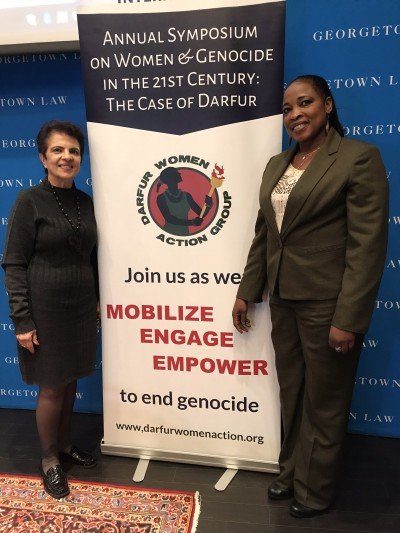Recently, I attended the 8th International Darfur Women Action Group Symposium. The Darfur Women Action Group is a women-led anti-atrocities non-profit organization founded by a fearless and hardworking woman Niemat Ahmadi.

Darfur Women Action Group Founder and President Niemat Ahmadi
The entire weekend conference was very informative. I was impressed by how it was inclusive of women struggling in not only Sudan, but other countries from Kyrgyzstan to the Yazidi women from Iraq.

Meeting with several participants at the 8th International Darfur Women Action Group Symposium
At the conference there was a recognition that the Sudanese people at long last are seeing some changes in their government from a 30 year-old dictatorship; so are the women. There is however still a lot of work that needs to be done for women to be truly become equal partners in Sudan.
The Sudanese women have played a pivotal role in fighting for rights of the Sudanese people.
My hope after the symposium is that the world will not once again forget the women of Sudan, and especially Darfur.
What barriers have women in Sudan faced?
Some laws in Sudan have explicitly restricted the ability of women to work and live freely in Sudan. A recent analysis of the legal context for women’s economic empowerment globally found that Sudan has 11 laws that restrict women’s legal capacity, placing it among the worst countries in terms of legal restrictions on women.
In 1991, the Muslim Family Law was codified, requiring wives to get their husband’s approval before working outside the home. In addition, the Personal Status Law for Muslims was also codified in 1991. This law legalizes child marriage, mandates a woman’s obedience to her husband and requires a woman’s male guardian to consent to her marriage.
Choices of Dressing
There are many laws that restrict women’s choices; Article 152 of the Criminal Act of 1991 prohibits “indecent and immoral acts” whereby women could face arrest and a punishment of up to 40 lashes if they wear clothing including pants or skirts that reach the knee.
Marital Rape Law
Marital rape remains legal. In 2018, 19-year-old Noura Hussein was sentenced to death for killing her husband, whom she had married at age 16, when he tried to rape her. Later her sentence was reduced to prison for five years and a fine.
Child Marriage
Sudanese laws allow child marriage for girls as young as 10 years old; it was estimated in 2010 that 10.7% of women aged 15 to 49 in Sudan were married before age 15. A Human Rights Watch report from 2016 found that the Sudanese government has targeted activists who raise awareness around these discriminatory laws.
CEDAW
Sudan is one of a few countries that have not ratified the Convention on the Elimination of all Forms of Discrimination against Women (CEDAW). Former President al-Bashir stated in 2001 that CEDAW “is against the morality and principles of a family” and that it contradicted Sudan’s national values.
Female Representation in Sports
Since President al-Bashir’s overthrow, Sudan has seen the creation of a women’s soccer league. This initiative demonstrates a greater effort by the new government to include women across society. For three decades, groups had tried to launch a league for women to play but have faced with difficulties. This new league is sponsored by Sudan’s Ministry of Youth and Sports. Across Sudan, the league includes 21 teams with female referees.
Female Representation in National Assembly
Since the change in Sudan’s electoral law in 2008 that implemented a gender quota of 25% for the National Assembly and Legislative Councils, female representation in Sudan’s National Assembly has exceeded 25%, prior to al-Bashir’s overthrow, female representation was at 27.7%. In addition, in Sudan’s upper house, the Council of States, female representation reached 35% following the renewal dates in June 2015.
Although the gender quota enables more women to participate in Sudanese politics, one analysis suggests that women’s political participation in Sudan has not led to more gender equitable laws. It states:
“women in parliament have not been able to bridge the political and religious divides and stand together as women in order to reform these laws in a more gender-equitable direction. But women are continuously and bravely putting women’s issues on the agenda, despite authoritarian constraints such as a weak parliament, lack of judicial independence and media censorship.”
In 2016, the International Republican Institute compiled an index of women’s representation in national governments in Africa. In the index, Sudan ranked among the lowest countries, “indicating low leadership and influence of women.”
Since former President al-Bashir’s overthrow in April 2019, women’s groups are pushing to secure more female involvement in the government. A representative of the Sudanese Professional Association, a group that organized the protests opposing al-Bashir, stated, “our ambition was to have 50% [female] representation in government, or at least 40%, but this didn’t happen.”
There are some indications that the transitional government is trying to include women. The current transitional Sovereign Council appointed two women out of the eleven total members. The Cabinet includes four women, including Sudan’s first female foreign minister, Asma Mohamed Abdalla. In addition, the Sovereign Council appointed Sudan’s first female chief justice of the judiciary, Neemat Abdullah. According to one media report, “the legislative body which is due to be formed soon to help steer the country to democratic elections in 2022 will have at least 40 percent of its seats reserved for women.”
There is still much work to be done to achieve equal rights of women. The Sudanese women activists many of whom I have known for many years, have persistently worked for all Sudanese people and especially Sudanese girls. There is still a lot of work to be done. I stand with my Sudanese sisters and look forward to working with them on these important issues. I also celebrate their achievements along the long road to equality.

Visiting Sudan in 2005 as Canada’s Special Envoy for Peace in Sudan